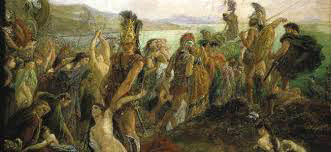In May the plan to strike directly at Strasburg was submitted by Sallust and me to Florentius and his general, Marcellus. It was promptly dismissed. We argued. We begged. We promised victory. But they would not listen.
“We are not yet ready to commit the army to a major battle. This is not the time.” As Marcellus was provincial commander-in-chief, I was forced to obey.
“At what time,” I asked, looking about the council chamber (we were in the prefect’s palace), “will we be able to obey the Emperor and drive the Germans out of Gaul?”
Florentius was suave. His manner to me, although still condescending, was more cautious than before. Obviously, I was not to fall without careful effort on his part.
“May I propose to the Caesar a compromise?” Florentius played with a delicate purse of deerskin, containing his god, gold. “We have not the men for a major campaign. Until the Emperor sends reinforcements, which he is not apt to do this year since he is already committed on the Danube, we must confine ourselves to holding what we have, and to regaining what we can, without too much risk.”
Florentius clapped his hands, and a secretary who was squatting against a wall sprang to his feet. Florentius was most imperial in his ways, but then, praetorian prefects are important men. At this time Florentius governed Morocco, Spain, Gaul and Britain. The secretary held up a map of Gaul.
Florentius pointed to a town called Autun, just north of us. “We have received news that the town is besieged.” I almost asked why I had not been told before, but I held my tongue. “Now if the Caesar chooses, he might-with General Sallust”—Florentius addressed a small crooked smile at Sallust, whose face remained politely attentive—“relieve Autun. It is an old city. The walls were once impregnable but they are now in considerable disrepair, like nearly all our defences, I’m afraid. There is not much of a garrison but the townspeople are valiant.”
I told him quickly that nothing would please me more. I would go immediately to the relief of Autun.
“Of course,” said Florentius, “it will take several weeks to equip your troops, to assemble supplies, to…”
“One good thing,” Marcellus interrupted, “you won’t have to worry about siege engines. Even if the Germans capture the city before you get there, they won’t occupy it. They never do.”
“But what about Cologne and Strasbourg?”
“Destroyed,” said Marcellus, with almost as much pleasure as if he personally had done the destroying. “But not occupied. The Germans are frightened of cities. They won’t stay in one overnight.”
“Their custom,” said Florentius, “is to occupy the countryside around a city and starve the inhabitants. When the city finally capitulates, they burn it and move on.”
“How many troops will I be allowed?”
“We are not certain just yet. There are other… contingencies.” Florentius shifted from hand to hand the purse of gold. “But in a few weeks we shall know and then the Caesar may begin his first… Gallic war.” This jibe was crude but I had learned not to show offence.
“Then see to it, Prefect,” I said, as royally as possible, and accompanied by Sallust I left the palace.
As we walked through the city streets to my villa, not even the memory of Florentius’s contempt could shatter the delight I took in the thought of action. “Just one successful campaign and Constantius will give me the whole army!”
“Perhaps.” Sallust was thoughtful. We crossed the square, where carts from the countryside were gathering with the first of the season’s produce. Two guards followed me at a discreet distance. Though I was Caesar, the townspeople were by now quite used to seeing me wander alone in the streets and where before they had done me frightened obeisance, they now greeted me—respectfully of course—as a neighbour.
“Only….” Sallust stopped.
“Only if I have too great a victory, Constantius will see to it that I never command an army again.”
“Exactly.”
I shrugged. “I must take my chances. Besides, after the Danube, Constantius will have to face the Persians. He’ll have no choice except to trust me. There’s no one else. If I can hold Gaul, then he must let me.”
“But suppose he does not go against Persia? Suppose he moves against you?”
“Suppose I am struck dead by… that cart?” And we both leaped to the side of the road as a bullock-cart rumbled past us while its driver loudly cursed it and us and the gods who had made him late for market. “It will be all right, Sallust,” I said as we approached the villa. “I have had signs.”
Sallust accepted this, for he knew that I was under the special protection of Hermes, who is the swift intelligence of the universe.
